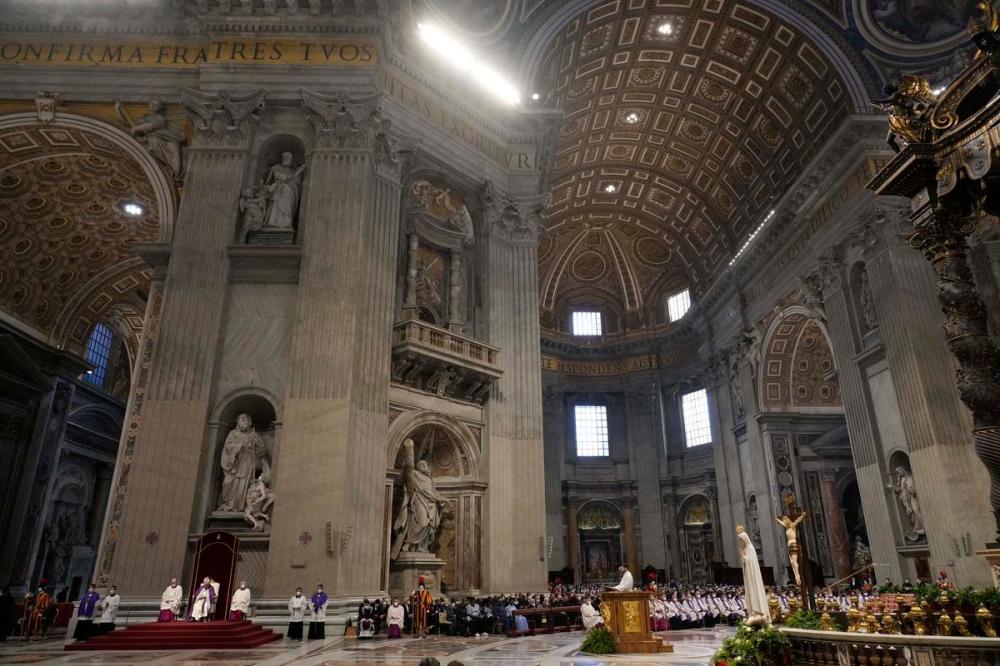Here’s how the Indigenous delegation’s visit with Pope Francis will unfold
Advertisement
Read this article for free:
or
Already have an account? Log in here »
To continue reading, please subscribe:
Monthly Digital Subscription
$0 for the first 4 weeks*
- Enjoy unlimited reading on winnipegfreepress.com
- Read the E-Edition, our digital replica newspaper
- Access News Break, our award-winning app
- Play interactive puzzles
*No charge for 4 weeks then price increases to the regular rate of $19.00 plus GST every four weeks. Offer available to new and qualified returning subscribers only. Cancel any time.
Monthly Digital Subscription
$4.75/week*
- Enjoy unlimited reading on winnipegfreepress.com
- Read the E-Edition, our digital replica newspaper
- Access News Break, our award-winning app
- Play interactive puzzles
*Billed as $19 plus GST every four weeks. Cancel any time.
To continue reading, please subscribe:
Add Free Press access to your Brandon Sun subscription for only an additional
$1 for the first 4 weeks*
*Your next subscription payment will increase by $1.00 and you will be charged $16.99 plus GST for four weeks. After four weeks, your payment will increase to $23.99 plus GST every four weeks.
Read unlimited articles for free today:
or
Already have an account? Log in here »
Hey there, time traveller!
This article was published 27/03/2022 (1356 days ago), so information in it may no longer be current.
One hour. That’s the amount of time each of the First Nation, Metis and Inuit delegations will have in private meetings with Pope Francis in Rome toward the healing and reconciliation between the church and Canada’s Indigenous people.
The 60 minutes or 3,600 seconds may not appear to be a lot of time, given the eight-hour flight and 6,500-kilometre trip from Montreal to the Vatican.
But the long-anticipated meeting with the Holy See — already delayed from December due to the pandemic — will let the 32 primary delegates, many of them elders and residential school survivors, share their stories face-to-face with the Pontiff.

Most of them will also be asking for a formal apology for their multi-generational pain and suffering from the head of the Catholic Church; he is one of the last major leaders of an organization instrumental in the abusive system who has yet to apologize.
“As Canadian Bishops, we are grateful to these delegates for walking with us on this journey and to Pope Francis for his attention to their suffering and his deeply-held commitment to social justice,” said the Most Rev. Raymond Poisson, president of the Canadian Conference of Catholic Bishops.
“We expect that these private encounters will allow the Holy Father to meaningfully address both the ongoing trauma and legacy of suffering faced by Indigenous Peoples to this day, as well as the role of the Catholic Church in the residential school system, which contributed to the suppression of Indigenous languages, culture and spirituality.”
Because the visit is being led by the CCCB and Indigenous organizations, the federal government is not sending any officials to the Vatican. Ottawa is providing support to delegates by providing personal protective equipment and mental health services, said Crown-Indigenous Relations Minister Marc Miller’s office.
“Mental health support professionals will be travelling to Rome with the Indigenous delegations. They will ensure members of the delegation have access to culturally-sensitive emotional and mental health supports,” the statement said.
Nearly three-quarters of Canada’s 130 residential schools were run by Roman Catholic missionary congregations, which an estimated 150,000 Indigenous children were forced to attend. The others were run by the Presbyterian, Anglican and United churches, which have all apologized for the policy and abuses, as have the Catholic Bishops of Canada and the Canadian government.
Some 170 participants — Indigenous elders, knowledge keepers, residential school survivors and youth, along with staff, families and supporters — will gather in Montreal from coast to coast and leave together for the Vatican on Saturday. Some 75 journalists will also be travelling to cover the historical trip.
Both Metis and Inuit delegates will have their hour-long meetings with the Pope on Monday morning, while the private meeting with the First Nations group is scheduled for Thursday.
While in Rome, delegates have the opportunity to tour Vatican museums and local chapels as well as Assisi, the birth place of Saint Francis.
An organizer said the light itinerary is to ensure some of the elders, already in their 80s, enough rest time amid the time change and jet lag. A 60-minute encounter with the Pope, himself 85, is considered a long meeting, when even world leaders normally only get 15 minutes.
On Friday, the day before their return to Canada, all primary and secondary delegates will have another hour with the Holy Father, where there will be prayers, cultural presentations such as songs, dance and drumming, along with final remarks by the Pope.
“The way Canadians are going to look at what they’re going to be seeing is a bunch of survivors and a bunch of people going to Rome. And it’s just going to be a holiday. That’s the attitude of Canadians in regards to the residential school issue,” said Ted Quewezance, a former chief of the Keeseekoose First Nation in Saskatchewan, who is part of the Indigenous delegation.
“I look at it as a different perspective. For me, it’s going to be five working days for me to accomplish what the next steps are from the Vatican down to the bishops and down to the communities of survivors. That’s the plan I would like to see.”
With a file from Raisa Patel
Nicholas Keung is a Toronto-based reporter covering immigration for the Star. Follow him on Twitter: @nkeung






